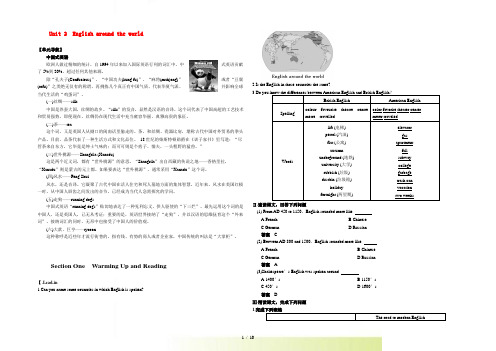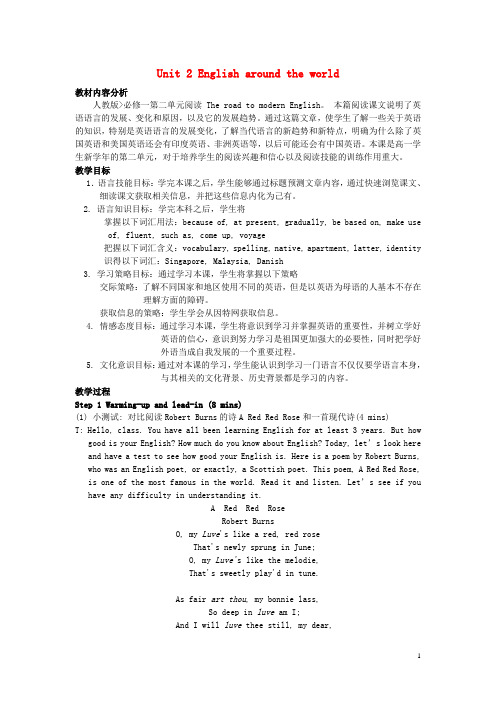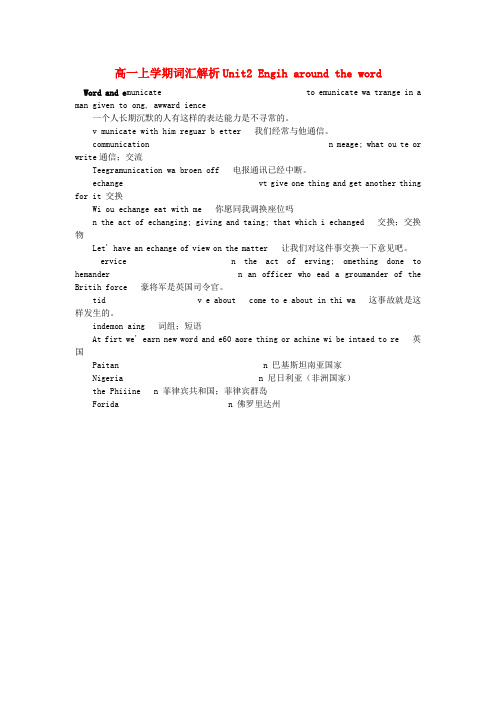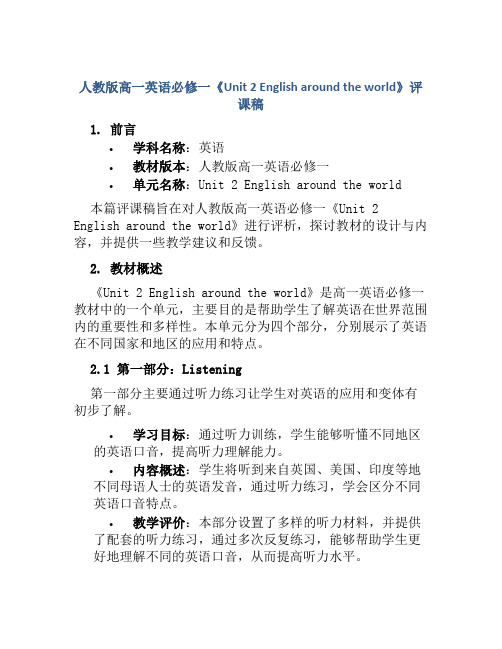高中英语 Unit 2English around the world Discovering Useful Structures教学设计 新人教版必修1
高中英语 Unit2 English around the world 教材导学 新人教版必修1

Unit 2 English around the world【单元导航】中国式英语欧洲人做过精细的统计,自1994年以来加入国际英语行列的词汇中,中式英语贡献了5%到20%,超过任何其他来源。
除“孔夫子(Confucious)”、“中国功夫(kung fu)”、“麻将(mahjong)”或者“豆腐(tofu)”之类绝无仅有的称谓,再挑拣几个真正有中国气质、代表华夏气派、并影响全球当代生活的“鸡蛋词”。
(一)丝绸——silk中国是养蚕大国,丝绸的故乡。
“silk”的发音,显然是汉语的音译,这个词代表了中国高超的工艺技术和贸易强势。
即便现在,丝绸仍在现代生活中充当雍容华丽、典雅高贵的象征。
(二)茶——tea这个词,又是英国人从拗口的闽南话里偷走的。
茶,和丝绸、瓷器比肩,堪称古代中国对外贸易的拳头产品。
目前,品茶代表了一种生活方式和文化品位。
18世纪的柴斯特顿勋爵在《训子家书》里写道:“尽管茶来自东方,它毕竟是绅士气味的;而可可则是个痞子、懦夫,一头粗野的猛兽。
”(三)世外桃源——Shangrila (Xanadu)这是两个近义词,都有“世外桃源”的意思。
“Shangrila”出自西藏的传说之地——香格里拉,“Xanadu”则是蒙古的元上都。
如果要表达“世外桃源”,通常采用“Xanadu”这个词。
(四)风水——Feng Shui风水,还是音译。
它凝聚了古代中国在活人住宅和死人墓地方面的集体智慧。
近年来,风水在美国红极一时,从中国人唇齿之间发出的音节,已经成为当代人急需探究的学问。
(五)走狗——running dogs中国式英语“running dogs”贴切地表达了一种见利忘义、供人驱使的“下三烂”。
最先运用这个词的是中国人,还是英国人,已无从考证;重要的是,英语世界接纳了“走狗”,并以汉语的思维抚育这个“外来词”。
接纳词汇的同时,无形中也接受了中国人的价值观。
(六)大款、巨亨——tycoon这种称呼是近些年才流行街巷的,指有钱、有势的商人或者企业家,中国传统的叫法是“大掌柜”。
unit-2-english-around-the-world

5. How is English learned in China? Is it learned as a foreign or a second language?
Summary
English is a ______ ______ all around the world. For more than 375 million people in countries such as a ______and ______, English is their______ ______ . Another 375 million people ______ ______as a second language. However, most people learn English at school as a ______ ______. The English language ______also ______
3.In which countries do we find most native speakers of English? Give the names of five countries.
4. How is English used in countries such as India, Pakistan, Nigeria and Philippines?
by most international organizations as their working language, as well as in international ______and ______. Most foreigners visiting China are either ______or ______. If they cannot speak Chinese, they use ______ to communicate with Chinese people. In global culture, for example the Internet or popular music, English is widely used. In the
高中英语 Unit 2 English around the world Reading The road to modern English教学设计 新人教版必修1

Unit 2 English around the world教材内容分析人教版>必修一第二单元阅读The road to modern English。
本篇阅读课文说明了英语语言的发展、变化和原因,以及它的发展趋势。
通过这篇文章,使学生了解一些关于英语的知识,特别是英语语言的发展变化,了解当代语言的新趋势和新特点,明确为什么除了英国英语和美国英语还会有印度英语、非洲英语等,以后可能还会有中国英语。
本课是高一学生新学年的第二单元,对于培养学生的阅读兴趣和信心以及阅读技能的训练作用重大。
教学目标1.语言技能目标:学完本课之后,学生能够通过标题预测文章内容,通过快速浏览课文、细读课文获取相关信息,并把这些信息内化为己有。
2. 语言知识目标:学完本科之后,学生将掌握以下词汇用法:because of, at present, gradually, be based on, make use of, fluent, such as, come up, voyage把握以下词汇含义:vocabulary, spelling, native, apartment, latter, identity 识得以下词汇:Singapore, Malaysia, Danish3. 学习策略目标:通过学习本课,学生将掌握以下策略交际策略:了解不同国家和地区使用不同的英语,但是以英语为母语的人基本不存在理解方面的障碍。
获取信息的策略:学生学会从因特网获取信息。
4. 情感态度目标:通过学习本课,学生将意识到学习并掌握英语的重要性,并树立学好英语的信心,意识到努力学习是祖国更加强大的必要性,同时把学好外语当成自我发展的一个重要过程。
5. 文化意识目标:通过对本课的学习,学生能认识到学习一门语言不仅仅要学语言本身,与其相关的文化背景、历史背景都是学习的内容。
教学过程Step 1 Warming-up and lead-in (8 mins)(1) 小测试: 对比阅读Robert Burns的诗A Red Red Rose和一首现代诗(4 mins)T: Hello, class. You have all been learning English for at least 3 years. But how good is your English? How much do you know about English? Today, let’s look here and have a test to see how good your English is. Here is a poem by Robert Burns, who was an English poet, or exactly, a Scottish poet. This poem, A Red Red Rose, is one of the most famous in the world. Read it and listen. Let’s see if you have any difficulty in understanding it.A Red Red RoseRobert BurnsO, my Luve's like a red, red roseThat's newly sprung in June;O, my Luve's like the melodie,That's sweetly play'd in tune.As fair art thou, my bonnie lass,So deep in luve am I;And I will luve thee still, my dear,Till a' the seas gang dry.Till a' the seas gang dry, my dear,And the rocks melt wi' the sun;I will luve thee still, my dear,While the sands o' life shall run.And fare thee well, my only Luve!And fare thee well, a while!And I will come again, my Luve,Tho' it were ten thousand mile!T: Did you find it easy or difficult? What about this one? This poem was written by a modern writer.I Am Not YoursI am not yours, not lost in you,Not lost, although I long to beLost as a candle lit at noon,Lost as a snowflake in the sea.You love me, and I find you stillA spirit beautiful and bright,Yet I am I, who long to beLost as a light is lost in light.Oh plunge me deep in love—put outMy senses, leave me deaf and blind,Swept by the tempest of your love,A taper in a rushing wind.T: Why is the first poem difficult to understand while the second one not? (Mainly because of some of the words used in the first poem, which are not often used now. Robert Burns lived in the 18th century while the writer of the second poem is a modern poet.) So we can see people in the past used different words from what is used today.(2) 听一段一位学生和来自澳大利亚的外教的对话(4 mins)T: Now, when one day Qiu Zhensong met our foreign teacher Zak, who is from Australia, what happened? Let’s welcome Zak and Qiu Zhensong.(After the dialogue, the foreign teacher explained.) Did you understand our dialogue? (Ss: No.) What’s the difficulty? (Different words were used in Australia which you do not know in American or British English.) T: So from the two poems and the dialogue we can see people from different countries speak different English and people in different times also use different English. How did the difference come about?[意图说明] 引入话题:不同时代、不同国家所使用的英语有所不同。
人教版高中英语必修一 Unit2English around the world

人教版高中英语必修一Unit2English around theworld人教版高中英语必修一Unit2English around the world 的单词和词组练习一、基本词汇:n. :1) elevator 电梯2) gas气体;汽油;煤气;毒气3) apartment(美)公寓4) spelling拼写;拼法5) Singapore新加坡6) lorry(英)卡车7) lightning闪电8) cab出租车9) petrol(英)汽油10)voyage航行;航海11)vocabulary词汇;词汇量;词汇表12)identity本身;本体;身份13)Malaysia马来西亚;马来群岛14)accent口音;腔调;重音15)block街区;块;木块;石块adj. :1) latter较后的;后半的;(两者中)后者的2) African非洲的;非洲人的;非洲语言的3) southeastern东南方的4) Midwestern中西部;有中西部特征的5) eastern东部的;东方的6) northwestern西北方的n./v. :1)base以……为基础;基部;基地;基础2)mand命令;指令;掌握;命令;指挥;支配3)request请求;要求n./adj.:1)native本地人;本国人;本国的;本地的2)Danish丹麦语;丹麦的;丹麦人的;丹麦语的3)Spanish西班牙人;西班牙语;西班牙的;西班牙人的;西班牙语的adj/adv.1) straight直接;挺直;直的;笔直的;正直的二、重点词汇:1) use n&v. 用处;使用 usage n.用法;词语惯用法2) express v.表达 expression n.词语;表达;表情3) recognize v. 辨认出;承认 recognition n.认出;识别;承认4) actually adv. 实际上 actual adj.实际上的5) graadually adv. 逐渐地;逐步地 gradual adj.逐渐的;逐步的6) fulently adv. 流利地 fluency n.流利;流畅 fulent adj.流利的7) frequently adv. 常常;频繁地 frequent adj.频繁的;常见的8) office n. 办公室 official adj.官方的三、重点短语:1) because of… 由于;因为because of和 because的区别:beccause of(后接词组或单词)because (作连词,后跟句子)eg:He was late not only because of his illness but also because he missed the train.不仅因为他的病痛而且因为他误了火车他才迟到的。
高一英语上学期 Unit2 English around the world词汇解析

高一上学期词汇解析Unit2 Engih around the wordWord and e municate to emunicate wa trange in a man given to ong, awward ience一个人长期沉默的人有这样的表达能力是不寻常的。
v municate with him reguar b etter 我们经常与他通信。
communication n meage; what ou te or write通信;交流Teegramunication wa broen off 电报通讯已经中断。
echange vt give one thing and get another thing for it 交换Wi ou echange eat with me 你愿同我调换座位吗n the act of echanging; giving and taing; that which i echanged 交换;交换物Let' have an echange of view on the matter 让我们对这件事交换一下意见吧。
ervice n the act of erving; omething done to hemander n an officer who ead a groumander of the Britih force 豪将军是英国司令官。
tid v e about come to e about in thi wa 这事故就是这样发生的。
indemon aing 词组;短语At firt we' earn new word and e60 aore thing or achine wi be intaed to re 英国Paitan n 巴基斯坦南亚国家Nigeria n 尼日利亚(非洲国家)the Phiiine n 菲律宾共和国;菲律宾群岛Forida n 佛罗里达州。
人教版高一英语必修一《Unit 2 English around the world》评课稿

人教版高一英语必修一《Unit 2 English around the world》评课稿1. 前言•学科名称:英语•教材版本:人教版高一英语必修一•单元名称:Unit 2 English around the world 本篇评课稿旨在对人教版高一英语必修一《Unit 2 English around the world》进行评析,探讨教材的设计与内容,并提供一些教学建议和反馈。
2. 教材概述《Unit 2 English around the world》是高一英语必修一教材中的一个单元,主要目的是帮助学生了解英语在世界范围内的重要性和多样性。
本单元分为四个部分,分别展示了英语在不同国家和地区的应用和特点。
2.1 第一部分:Listening第一部分主要通过听力练习让学生对英语的应用和变体有初步了解。
•学习目标:通过听力训练,学生能够听懂不同地区的英语口音,提高听力理解能力。
•内容概述:学生将听到来自英国、美国、印度等地不同母语人士的英语发音,通过听力练习,学会区分不同英语口音特点。
•教学评价:本部分设置了多样的听力材料,并提供了配套的听力练习,通过多次反复练习,能够帮助学生更好地理解不同的英语口音,从而提高听力水平。
•建议与反馈:为了进一步提高学生的听力理解能力,可以增加一些真实英语对话的听力材料,并提供更多的听力练习题,引导学生进行听力训练。
2.2 第二部分:Speaking第二部分通过讲话和对话的练习,提高学生的口语表达能力以及交际能力。
•学习目标:通过课堂练习,学生能够模仿并正确运用英语口音和语调,并能够进行简单的英语对话和交流。
•内容概述:学生将练习模仿英美人士的英语发音,进行有关英语使用的对话练习,如问路、订购食物等场景。
•教学评价:本部分通过组织学生进行角色扮演和小组对话的方式,有效地锻炼了学生的口语表达能力,激发了学生的兴趣和参与度。
•建议与反馈:为了提高学生的口语表达水平,可以增加一些生活化实用的对话练习,如购物、旅行等场景,让学生更好地应用所学知识。
人教高中英语必修一unit-2-English-around-the-world-单词讲解

latest adj.最新的;最近的;最后的 lately(=recently) adv.最近;近来
选词填空(latter/later/late/lately/latest) ①Here are Tom and David; the _l_a_t_te_r__ is my
04 come up
come up①_上__来__,走__近_②__被__提_出____ ③__发_生__,__出__现___④__发__芽____
英译汉 (1)A foreigner came up to me and asked me the way to the railway station. 一个外国人走到我面前问我去火车站的路。 (2)The grass is just beginning to come up.
(1)vt. 以……为根据
base... on/upon 把……建立在……的基础上 be based on/upon 以……为基础/依据
(2)n.基部;基地;基础 at the base of 以……为基点;在……的底部
1.你不应该把自己的快乐建立在别人的痛苦之上。
You shouldn’t base your happiness on/upon the other’s sadness.
④The koala(考拉) is native ___to____Australia.
____考__拉__原___产__于__澳__大__利__亚__。________________________
请替换文字内容
点击添加相关标题文字,点击添加相关标题文字,点击添加相关标题 文字,点击添加相关标题文字,点击添加相关标题文字。
unit2_English_around_the_world教案

unit2_English_around_the_world教案Unit 2 English around the worldPeriod 1Warming Up& Pre-readingTeaching aims: To make Ss to get to know some differences between British English and American English.Important and difficult points: To tell and grasp the differences between British English and American English.Teaching procedures:TO arouse the students’ interest and lead in the topic, the teacher can organize some activities. Step1: T:We have learned something about friendship in unit 1. Do you know what problems they will meet if a British boy wants to make friend with an American boy?Step2. Let Ss discuss how many countries use English as their official language and which countries.(教师可通过PPT的形式,借助以英语为官⽅语⾔的国家国旗和世界地图来辅助完成) And do you know that there is more than one kind of English? Ss may list America, Britain, Canada, Australia……Teacher writes “American English, British English, Canadian English, and Australian English……T: Are the Englishes talked around the world all the same? (先让学⽣⾃由讨论,然后⽼师播放⼀段来⾃不同国家的母语为英语的外国⼈的视频)Step3. Get the Ss to discuss in groups about the differences between American English and British English, and give some examples.a. Can you understand the different kinds of English these people are using?Speaker1: Let’s go to the pictures?Speaker2: Ok. But how shall we go to the movies?Speaker1: Why not go by underground?Speaker2: Er, but the subway station is far away.When you hear two native speakers of English, they may still not speak the same kind of English. Situation discussionJack is a British boy. He went to America for a trip in this summer vacation. The first day he went to a restaurant and looked around for a toilet. When he asked the waitress, she told him it is on the second floor. Jack went up two floors only to find empty rooms.Where is the toilet?BSpeaker1: Can you tell me how to spell the word “neighbor”?Speaker2: N-E-I-G-H-B-O-U-R, neighbour.Summary: Main differencesSpelling, pronunciation and vocabularyPeriod 2Reading and ComprehendingTeaching aims:1、To get students to have a general view about the historical development of English.2、To get students to know different kinds of English around the world, especially the differences between British English and American English.3、To i mprove the students’ reading ability.Important points:1、How to improve the students’ reading ability.2、How to make students enlarge their knowledge on English through reading.Difficult points:1、To be able to get the main idea from the text.2、To be able to use the different reading strategies for different purposes.3、Expressing one’s ideas why one should learn English.Teaching procedures:Step1: Lead-in1. Why should we learn English?Step2SkimmingRead quickly to get the main idea of the text.1. The text mainly tells us ___________.A. that old English is different from the English todayB. how Middle English formedC. English and its historyD. that English will keep changing2. The text is developed mainly by ____.A. placeB. timeC. peopleStep3Scanning【答案】 1.England 2.based 3.German 4.vocabulary5.change /doc/5eed1d4e915f804d2b16c193.html cation9.learners10.identityStep4DiscussionWork in groups. Discuss the following question and then ask two groups to report their answers to the class. 1. Why do you think more people in the world now want to learn Chinese?Period 3 Language pointsTeaching aims: To make Ss to know the meanings of the important words and phrases and master their usages. Important and difficult points:To master the important words and phrases.Teaching procedures:1、the road to modern English常与to连⽤的名词:key, answer, entrance, monument……e. g: the key to the bike, the entrance exam to collegeThere stands a Monument to the People’s Heroes on the hill.2、Do you know that there is more than one kind of English?(P9)你知道英语不⽌⼀种吗?more than的⽤法(1)more than ⽤在数字前,意为“⽐…..多;超过……” 意为“不⽌⼀个”(含义为复数,但谓语动词⽤单数)。
- 1、下载文档前请自行甄别文档内容的完整性,平台不提供额外的编辑、内容补充、找答案等附加服务。
- 2、"仅部分预览"的文档,不可在线预览部分如存在完整性等问题,可反馈申请退款(可完整预览的文档不适用该条件!)。
- 3、如文档侵犯您的权益,请联系客服反馈,我们会尽快为您处理(人工客服工作时间:9:00-18:30)。
1.Do the first tow sentences in Part 2 as examples.
2.Check the answers together.
1.Wb, Page 42, 43 (Individual, Groups)
2.Prepare forReadingon Page 44
My friend said she / he would come here the next day.
如果地点变了,时间还是今天,你来转述,应该说:
My friend sayd she / he will go there tomorrow.
如果时间地点都变了,你来转述,应该说:
My friend said She / he would go there the next day.
二.Ability goals
Enable the students to put what they have learned to practical use.
三.Emotional goals
Enable Ss to find their confidence in English learning.
Class-exercise
1.Present some sentences for Ss
1)My friend says,“I will come here tomorrow?”
如果此时此地,你来转述,应该说:
My friend says she / he will come here tomorrow?如果时间变了,地点不变,你来转述,应该说:
如果由别人转述,时间地点都变了,应该说:
He/ She said he /she would go 源自here the next day.
*使用直接引语和间接引语要注意具体语境。
.
2.Get the Ss to have a look at Part1 in“Discovering useful structures”and sum up this grammar point.
教学反思
Teaching difficult and important points
The transition between direct speech and indirect speech.
Teaching methods
Interactions
Teacher-student, individual, pairs, groups
高中英语人教版必修一教学设计:Unit 2English around the world Discovering Useful Structures
Teaching content
Teaching goals
一.Knowledge goals
To get the students to learn by observation what direct and indirect speech is and the transition between them.
